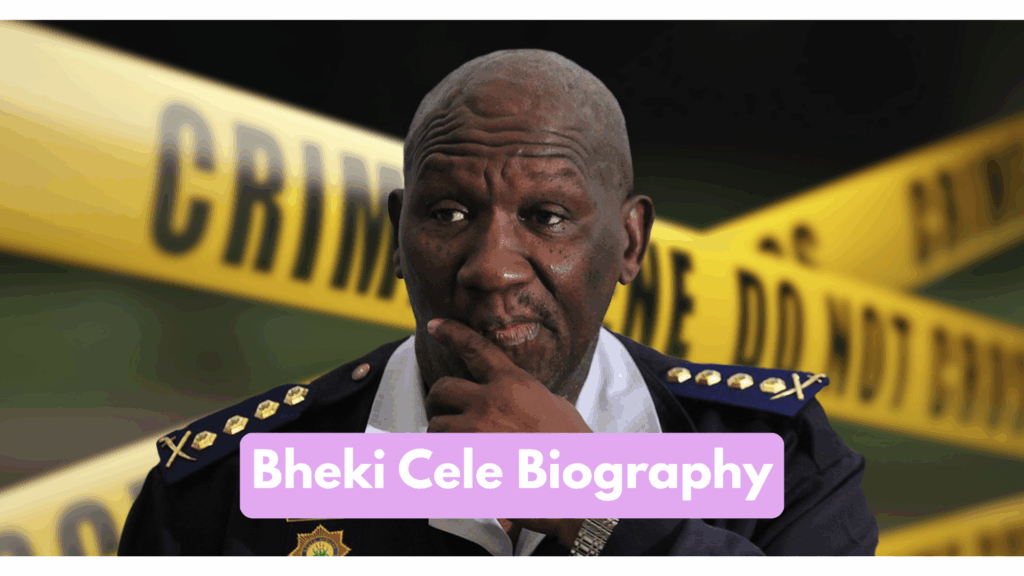Bheki Cele Biography: Qualifications, Nationality, Age, Net Worth, Politics, Tribe

Bheki Cele is one of South Africa’s most recognized and contentious political figures. As a long-serving public servant, former police chief, and later Minister of Police, Cele’s name has been associated with bold public statements, aggressive policing reforms, controversy, and resilience.
This biography traces his early life, rise through the ranks, key achievements, controversies, and his influence on South African policing and politics.
Early life and background
Born in the coastal region of KwaZulu-Natal, Bheki Cele grew up during apartheid-era South Africa, a formative environment that shaped the politics and careers of many activists and future leaders. His early life was marked by exposure to the social and political tensions of the time. While many public records highlight his strong community ties and early involvement in local structures, biographical details emphasize a path that led from grassroots engagement to national prominence.
Political awakening and early career
Cele’s early political awakening followed the tumultuous years of the struggle against apartheid and the transition to democracy. His early career included community organizing and involvement in structures linked to the African National Congress (ANC). Over time, he became known for his decisive, often confrontational approach to issues of crime and public order — traits that would mark his later career.
Rise in policing and public service
Cele’s formal roles in policing and public safety solidified his reputation. He served in senior police positions and became known as a hands-on leader who emphasized visible policing and direct action. Critics sometimes described his methods as heavy-handed, while supporters applauded his willingness to tackle crime directly.
Appointment as National Commissioner (brief)
In 2009, Bheki Cele briefly served as the National Commissioner of the South African Police Service (SAPS). His appointment was notable because it signaled a desire in some quarters for more assertive leadership within SAPS. His tenure was short and controversial due to administrative and political pushback, and he resigned after a brief period. This episode illustrated both the volatility of high-level policing roles and the political sensitivities around reform in South Africa.
As Minister of Police
Bheki Cele’s most high-profile role came when he was appointed Minister of Police. In this capacity, he became the national face of the country’s response to crime, violent gang activity, and public safety concerns. Cele’s ministerial approach emphasized:
- Visible, tactical policing operations.
- High-profile raids and interventions in areas with entrenched criminal networks.
- Regular and direct communication with the media and the public, often featuring strong rhetoric promising immediate action.
Proponents argued that his approach returned focus and urgency to crime-fighting. Detractors pointed to civil-liberties concerns, inconsistent outcomes, and the risk that policing rhetoric could intensify tensions in marginalized communities.
Key policies and initiatives
During his time as Minister, Cele supported a number of initiatives intended to strengthen policing effectiveness:
- Rapid deployment of specialized units to crime hotspots.
- Strengthened inter-agency coordination between national and provincial law enforcement bodies.
- High-visibility policing campaigns intended to restore public confidence.
- Emphasis on community policing, albeit sometimes overshadowed by tactical operations.
Achievements and impact
Cele’s supporters credit him with driving a tougher public posture against violent crime and drawing attention to inadequate resources in some police units. Concrete impacts include targeted operations that disrupted some criminal syndicates and a sustained conversation about reforming police management and improving frontline capacity. Even critics acknowledge his capacity to mobilize action and keep public safety on political agendas.
Controversies and criticisms
Bheki Cele’s career is punctuated by controversies that attracted media, public, and legal attention. Notable criticisms include:
- Accusations of inflammatory rhetoric that opponents argued could exacerbate tensions.
- Questions about the effectiveness and sustainability of short-term tactical campaigns.
- Administrative and legal disputes related to appointments and operational oversight.
- Criticism from civil-society groups over alleged heavy-handedness in certain operations.
A recurring theme in public debate was whether immediate, aggressive policing tactics provided long-term solutions to structural problems like poverty, unemployment, and social exclusion — root causes that feed crime.
Leadership style and public image
Cele’s leadership style is often described as direct, combative, and media-savvy. He frequently used public platforms to speak plainly about crime and policing, which gained both praise and condemnation. For some citizens, Cele became a symbol of decisive action; for others, a polarizing figure whose methods sometimes clashed with principles of measurement, oversight, and community-led problem solving.
Legacy and influence
Assessing Cele’s legacy requires balance. On one hand, he forced public debate and kept safety at the top of the national conversation. On the other, long-term crime reduction depends on structural investments and governance reforms beyond tactical policing. Regardless, his tenure impacted SAPS culture, political expectations of policing ministers, and the broader discourse on how South Africa should address violent crime.
Personal life
Details about Cele’s personal life are often kept private, as is common with many public officials. He is known to have strong ties to his community and to maintain relationships with political networks that have supported his public roles.
Frequently Asked Questions (FAQs)
Q1: Who is Bheki Cele?
A1: Bheki Cele is a South African political figure who has served in senior policing roles, including a brief stint as National Commissioner and as Minister of Police.
Q2: What is Bheki Cele known for?
A2: He is known for his outspoken style, high-visibility policing initiatives, and controversial statements and actions relating to law enforcement and crime reduction.
Q3: Has Bheki Cele been involved in controversies?
A3: Yes. His career includes controversies over rhetoric, operational methods, and administrative disputes. Critics accuse some tactics of being heavy-handed.
Q4: What are some achievements of Bheki Cele?
A4: Supporters credit him with drawing renewed focus to violent crime and spearheading targeted operations that disrupted certain criminal networks.
Q5: Is Bheki Cele still active in politics?
A5: As of the latest public records, Cele has remained a visible political figure. (For the most current status, check recent news sources.)
Conclusion
Bheki Cele is a multifaceted and polarizing figure in South African public life. His biography is a study in how bold leadership, controversial tactics, and deep-seated national problems intersect. Whether remembered for decisive intervention or criticized for polarizing rhetoric, Cele’s influence on policing debates in South Africa is undeniable. Any full assessment of his impact must consider both the immediate operations he led and the broader social reforms needed to reduce crime sustainably.


